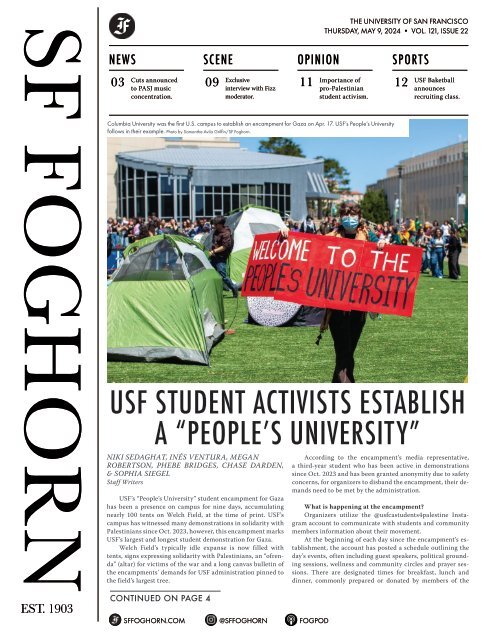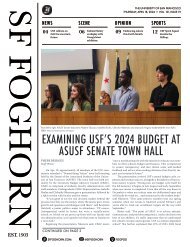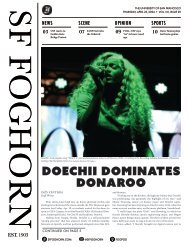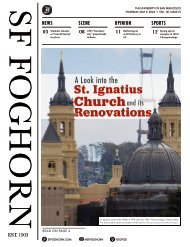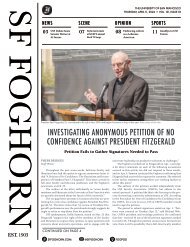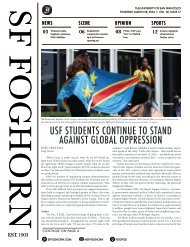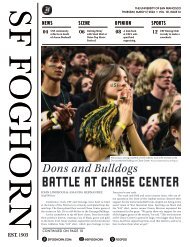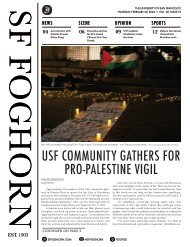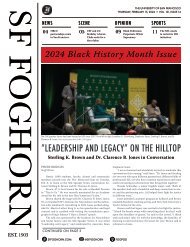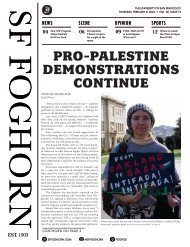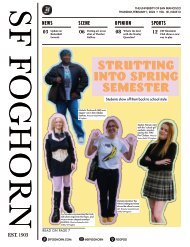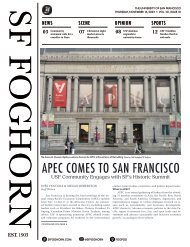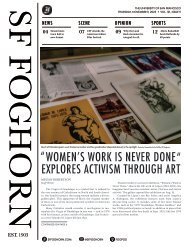ISSUE 22 FINAL
You also want an ePaper? Increase the reach of your titles
YUMPU automatically turns print PDFs into web optimized ePapers that Google loves.
SF FOGHORN<br />
EST. 1903<br />
NEWS<br />
03<br />
Cuts announced<br />
to PASJ music<br />
concentration.<br />
NIKI SEDAGHAT, INÉS VENTURA, MEGAN<br />
ROBERTSON, PHEBE BRIDGES, CHASE DARDEN,<br />
& SOPHIA SIEGEL<br />
Staff Writers<br />
USF’s “People’s University” student encampment for Gaza<br />
has been a presence on campus for nine days, accumulating<br />
nearly 100 tents on Welch Field, at the time of print. USF’s<br />
campus has witnessed many demonstrations in solidarity with<br />
Palestinians since Oct. 2023, however, this encampment marks<br />
USF’s largest and longest student demonstration for Gaza.<br />
Welch Field’s typically idle expanse is now filled with<br />
tents, signs expressing solidarity with Palestinians, an “ofrenda”<br />
(altar) for victims of the war and a long canvas bulletin of<br />
the encampments’ demands for USF administration pinned to<br />
the field’s largest tree.<br />
SFFOGHORN.COM<br />
SCENE<br />
09<br />
Exclusive<br />
interview with Fizz<br />
moderator.<br />
@SFFOGHORN<br />
OPINION<br />
11<br />
THE UNIVERSITY OF SAN FRANCISCO<br />
THURSDAY, MAY 9, 2024 • VOL. 121, <strong>ISSUE</strong> <strong>22</strong><br />
According to the encampment’s media representative,<br />
a third-year student who has been active in demonstrations<br />
since Oct. 2023 and has been granted anonymity due to safety<br />
concerns, for organizers to disband the encampment, their demands<br />
need to be met by the administration.<br />
What is happening at the encampment?<br />
Organizers utilize the @usfcastudents4palestine Instagram<br />
account to communicate with students and community<br />
members information about their movement.<br />
At the beginning of each day since the encampment’s establishment,<br />
the account has posted a schedule outlining the<br />
day’s events, often including guest speakers, political grounding<br />
sessions, wellness and community circles and prayer sessions.<br />
There are designated times for breakfast, lunch and<br />
dinner, commonly prepared or donated by members of the<br />
FOGPOD<br />
Importance of<br />
pro-Palestinian<br />
student activism.<br />
Columbia University was the first U.S. campus to establish an encampment for Gaza on Apr. 17. USF’s People’s University<br />
follows in their example. Photo by Samantha Avila Griffin/SF Foghorn.<br />
CONTINUED ON PAGE 4<br />
SPORTS<br />
12<br />
USF Baketball<br />
announces<br />
recruiting class.<br />
USF STUDENT ACTIVISTS ESTABLISH<br />
A “PEOPLE’S UNIVERSITY”
02 03<br />
THURSDAY<br />
MAY 9<br />
2024<br />
STAFF<br />
Editor in Chief<br />
MEGAN ROBERTSON<br />
mrrobertson2@dons.usfca.edu<br />
News Editor<br />
NIKI SEDAGHAT<br />
nisedaghat@dons.usfca.edu<br />
Opinion Editor<br />
CHISOM OKORAFOR<br />
cokorafor@dons.usfca.edu<br />
Scene Editor<br />
INÉS VENTURA<br />
ipventura@dons.usfca.edu<br />
Sports Editor<br />
CHASE DARDEN<br />
cbdarden@dons.usfca.edu<br />
Photography Editor<br />
SAMANTHA AVILA GRIFFIN<br />
svavilagriffin@dons.usfca.edu<br />
General Reporter<br />
PHEBE BRIDGES<br />
pjbridges@dons.usfca.edu<br />
General Reporter<br />
ELINA GRAHAM<br />
emgraham@dons.usfca.edu<br />
415.4<strong>22</strong>.5444<br />
sffoghorn.com<br />
SUBMISSION POLICY<br />
The San Francisco Foghorn is the<br />
official student newspaper of the<br />
University of San Francisco and<br />
is sponsored by the Associated<br />
Students of the University of San<br />
Francisco (ASUSF).<br />
The thoughts and opinions<br />
expressed herein are those of the<br />
individual writers and do not<br />
necessarily reflect those of the<br />
Foghorn staff, the administration,<br />
the faculty, staff or the students of<br />
the University of San Francisco.<br />
Contents of each issue are the sole<br />
responsibilities of the editors.<br />
An All-American<br />
Publication<br />
ad maiorem dei<br />
gloriam<br />
The San Francisco Foghorn is free<br />
of charge.<br />
Advertising matter printed herein<br />
is solely for informational purposes.<br />
Such printing is not to be construed<br />
as written or implied sponsorship<br />
or endorsement of such commercial<br />
enterprises or ventures by the San<br />
Francisco Foghorn.<br />
©MMIV-MMV, San Francisco<br />
Foghorn. All rights reserved. No<br />
material printed herein may be reproduced<br />
without prior permission<br />
of the Editor in Chief.<br />
SAN FRANCISCO<br />
FOGHORN<br />
Freedom and Fairness<br />
Managing Editor<br />
JORDAN PREMMER<br />
jepremmer@dons.usfca.edu<br />
Copy Editor<br />
SOPHIA SIEGEL<br />
scsiegel@dons.usfca.edu<br />
Layout Editor<br />
ANYA JORDAN<br />
arjordan@dons.usfca.edu<br />
Layout Editor<br />
HALLEY COMPUTESTO<br />
hmcompuesto@dons.usfca.edu<br />
Social Media Manager<br />
MARIA ZAIED<br />
mfzaied@dons.usfca.edu<br />
Online Editor<br />
ESHA DUPUGUNTLA<br />
ekdupuguntla@dons.usfca.edu<br />
ADVISOR<br />
TERESA MOORE<br />
2130 FULTON STREET, UC #417<br />
SAN FRANCISCO, CA 94117<br />
Columns for the Opinion section<br />
and Letters to the Editor are gladly<br />
accepted from students, faculty, staff<br />
and alumni.<br />
All materials must be signed and<br />
include your printed name, university<br />
status (class standing or title),<br />
address, and telephone number for<br />
verification. Anonymous submissions<br />
are not published.<br />
We reserve the right to edit materials<br />
submitted. All submissions<br />
become the property of the San<br />
Francisco Foghorn.<br />
Staff editorials are written by the<br />
Foghorn editorial staff and represent<br />
a group consensus.<br />
The San Francisco Foghorn Opinion<br />
page is a forum for the free, fair and<br />
civil exchange of ideas. Contributors’<br />
opinions are not meant to<br />
reflect the views of the Foghorn staff<br />
or the University of San Francisco.<br />
Students interested in contributing<br />
to the Foghorn can scan and fill out<br />
the QR code below.<br />
LETTER FROM THE EDITOR<br />
Dear Readers,<br />
It’s hard to believe we’ve come to the end of the year. Since August, here at<br />
the Foghorn we have published a total of <strong>22</strong>3 articles throughout our <strong>22</strong> issues.<br />
This year’s news section has been marked by coverage of student protest<br />
and solidarity with Palestinians in Gaza, as exemplified by the in-depth reporting<br />
in this issue. I am immensely proud of the Foghorn’s journalists and<br />
their commitment to truth in reporting on war and genocide. Our news section<br />
has further investigated an anonymous petition of no confidence against<br />
President Paul Fitzgerald, S.J., in addition to covering numerous political<br />
events in San Francisco.<br />
In our scene section, we’ve covered concerts, interviewing artists like<br />
Doechii and Kamaiyah. We have attended the Chinese New Year Parade, the<br />
reopening of Presentation Theater and the Hardly Strictly Bluegrass music<br />
festival.<br />
Students and community members have voiced their opinions in our paper<br />
on everything from bringing the African National Congress to USF to the<br />
importance of reforming Greek life. Opinion Editor Chisom Okorafor brought<br />
back polls to the Foghorn, asking students about topics such as President Joe<br />
Biden’s TikTok Ban, Palestinian-led Boycott, Divestment and Sanctions (BDS)<br />
and students’ religious affiliations.<br />
We’ve developed a team of deputy sports writers and photographers committed<br />
to sharing a myriad of campus stories. We’ve covered the cancellation<br />
of the tennis program along with the teams’ last matches, the revitalization of<br />
USF boxing and the Dons Basketball’s game at Chase Center.<br />
The Foghorn has crafted special issues for Black History Month, Filipino<br />
American History Month and Hispanic Heritage Month.<br />
Perhaps our largest project of the year, in Dec. 2023 we released a 120th<br />
anniversary edition of the Foghorn. Collaborating with the Gleeson Library<br />
Archives, we spoke to nine alumni of the Foghorn, graduates from 1950 to<br />
20<strong>22</strong>, to get a sense of what the paper and USF community were like during<br />
their time here.<br />
The Foghorn would not be what it is without the incredible work of 19<br />
student staffers throughout the past two semesters. I have nothing but immense<br />
gratitude and respect for Jordan DelFiugo, Niki Sedaghat, Phebe Bridges,<br />
Chase Darden, Inés Ventura, Chisom Okorafor, Sophia Siegel, Anya Jordan,<br />
Oliver River Satalich, Ava Lord, Samantha Avila Griffin, Halley Computesto,<br />
Elina Graham, Jordan Tyler Maralit, Esha Dupuguntla and Maria Zaied.<br />
This year has also marked an incredible crop of deputy writers and photographers,<br />
including Kaleb Martinez, Amanda Hernandez, John Lindroos<br />
and Veston Smith.<br />
I’d like to thank our advisor, Professor Teresa Moore, for her decades of<br />
dedication to the Foghorn. Her insight and advice have been vital to the paper’s<br />
production.<br />
The amazing Jordan Premmer will be taking on the role of editor-in-chief<br />
in the fall semester. Jordan has been at the Foghorn since fall 20<strong>22</strong>, working<br />
as scene editor and then as managing editor. Jordan has just finished hiring<br />
a wonderful team of Foghorn staffers to continue this work in the fall, and I<br />
have no doubt in my mind that they will continue the Foghorn’s legacy.<br />
It’s not lost on me that this is a particularly important historical moment<br />
to be producing student journalism. Just this past week, the Pulitzer<br />
Prize committee honored student journalists at Columbia University for their<br />
“‘extraordinary real-time reporting…under difficult and dangerous circumstances,’”<br />
according to the New York Times. I fervently believe that student<br />
journalists have such an important role. Being a part of the Foghorn since my<br />
freshman year has been such a joy. It has been an honor to lead the Foghorn as<br />
we attempt to make a contribution to San Francisco’s media landscape. Thank<br />
you all for reading.<br />
Warm wishes,<br />
Megan Robertson<br />
USF PLANS TO SUSPEND PASJ MUSIC CONCENTRATION<br />
ELINA GRAHAM<br />
Staff Writer<br />
Performing Arts and Social Justice (PASJ) music faculty and students<br />
were informed via email on Apr. 19 that USF intends to suspend<br />
the music concentration of the PASJ major in the upcoming academic<br />
year.<br />
In his email, PASJ Department Chair Roberto Gutiérrez Varea,<br />
stated that the administration proposed the change following the departure<br />
of two full-time music professors and “the university’s need to<br />
make substantial budgetary cuts.”Varea wrote that these two factors<br />
have left the administration to “consider additional measures such as<br />
beginning to charge for music lessons, among other adjustments.”<br />
Currently, all PASJ students are required to choose a concentration<br />
in music, theater or dance. The cancellation of the music concentration<br />
would leave students with only theater and dance as options,<br />
and limits music to a minor.<br />
Varea’s email states that all current music students, within the<br />
PASJ major, will be able to graduate with their music concentration,<br />
despite the cancellation of their program.<br />
Jeffrey Paris, interim dean of the College of Arts and Sciences<br />
stated to the Foghorn, “Changes to academic programs are always difficult,<br />
as we strive to support our existing degree programs and offer<br />
new programs and opportunities to meet student needs.”<br />
Nia Bossier, junior media studies major and music minor said, “So<br />
many people are missing out because they never knew about the music<br />
options available... I [initially] didn’t even bring my violin to USF.”<br />
Starting in the spring of 2025, private music lessons in voice and<br />
instrument will now require an additional fee from students — currently<br />
and historically they have been included in the cost of tuition.<br />
Private lessons are two unit courses. The proposed additional cost is<br />
$375 per unit, totalling an extra $750 per semester for music students.<br />
Historically, private lessons have been required for PASJ music students<br />
and offered as electives for minors.<br />
Paris stated,“All currently enrolled [PASJ] Majors with a concentration<br />
in Music will have the opportunity to complete any required<br />
Music Lessons courses in Fall 2024 with no fees attached to their registration…<br />
We deferred instituting these fees for as long as we were<br />
able,” he continued. When asked if students will be financially supported<br />
in the extra fee, Paris did not provide comment.<br />
Dom Brooks, senior PASJ major with a music concentration, said,<br />
“Putting an extra financial stress on musicians is entirely antithetical<br />
to the social justice portion of our major.” They noted that the<br />
attention from the faculty, in these lessons, often extends beyond traditional<br />
training. Brooks’ voice instructor at USF sought out special<br />
voice training, in order to better teach them through their transition<br />
process as a transmasculine singer.<br />
“There is such a deep level of care and support I feel from every<br />
person in PASJ,” Brooks said.<br />
Daria D’Andrea, adjunct professor of violin and viola and director<br />
of chamber ensembles said, “Many times I have worked with students<br />
who… [have] never had the benefit of individual attention.”<br />
In a PASJ town hall meeting on May 2, held in the Presentation<br />
Theater and open to the USF community, faculty and students shared<br />
feelings on this news. Speakers shared their concern that the administration<br />
did not consult music students and faculty before presenting<br />
changes, and many asked why the University is unable to promote a<br />
current PASJ faculty to full time status so that the music concentration<br />
can continue.<br />
Additionally at the town hall, students and faculty discussed how<br />
the cancellation coincided with the recent renovation of the Presentation<br />
Theater, a project which is still awaiting completion. Renovations<br />
were funded by a recent $15 million donation from USF alumnus and<br />
musician Gordon Getty.<br />
The Ann and Gordon Getty Foundation for the Arts has donated<br />
nearly $30 million to USF, much of which was set to elevate various<br />
arts programs at USF, according to President Paul J. Fitzgerald, S.J. In<br />
an article from USF’s Office of Development Communications, published<br />
in May 20<strong>22</strong>, he said, “This significant support of USF continues<br />
to ensure that our students have the opportunity to engage in worldclass<br />
arts programs. This gift ensures we will continue to evolve and<br />
elevate the arts education in San Francisco for the next generation.”<br />
When asked why the music concentration was being cut despite<br />
Getty’s gifts, Paris stated, “Along with renovation of the historical<br />
Presentation Theater… the gift will support arts facilities and operations,<br />
create the Ann Getty Endowed Chair, and provide additional<br />
scholarships for students.”<br />
Brooks said, “I think the university is showing the lack of dedication<br />
and support they have for our department when they propose<br />
changes like this. I hope that the university will communicate with us<br />
so we can keep working together on strategies to keep this program<br />
alive and thriving for all who come after us.”<br />
Editor-in-Chief: Megan Robertson, Chief Copy Editor: Sophia Siegel,<br />
News Editor: Niki Sedaghat, Scene Editor: Inés Ventura<br />
ASUSF Voices performed their music showcase at the Presentation Theater on Apr. 20, to celebrate 35 years of the ASUSF Voices choral program. Photo courtesy of Rick Roberts.<br />
NEWS
04 05<br />
THURSDAY<br />
MAY 9<br />
2024<br />
NEWS<br />
CONTINUED FROM FRONT PAGE<br />
surrounding community. The encampment hosts tables and tents<br />
dedicated to medical services, food and information booths.<br />
The @usfcastudents4palestine account posted a list of 11 community<br />
guidelines and principles of unity on the second day of the<br />
encampment, which participants recite together each day. These include<br />
a commitment “to remain grounded in why [students] enter this<br />
space,” a recognition of “our roles as visitors, and for many settlers, on<br />
this land” and a commitment “to good-faith engagement.”<br />
How did this begin?<br />
Approximately 150 students, professors and community members<br />
gathered for a “USF Divest From Israel” walkout on Apr. 29, which<br />
then became the creation of the encampment.<br />
After addressing the crowd, organizers led the protestors towards<br />
Welch Field. As the group approached, students ran out towards the<br />
field and began to assemble tents as other walk-out attendees locked<br />
arms and formed a wide circle around them. Students pulled out tents,<br />
sleeping bags and other supplies from blue bins, which are typically<br />
used to move students in and out of dormitories.<br />
A speaker addressed the crowd saying, “Welcome USF students,<br />
welcome to our People’s University of Palestine! We have come together<br />
to join the national student movement and demand USF to uphold<br />
its own mission statement and oppose the genocide against Palestinians<br />
in Gaza.” Students circling the encampment were invited to approach<br />
organizers if they wished to camp.<br />
By the end of the encampment’s first day on Apr. 29, 47 tents were<br />
set up on Welch Field.<br />
USF has joined a myriad of other schools with pro-Palestinian encampments<br />
on-campus. Protestors at Columbia University were the<br />
first to set up an encampment for Gaza, beginning on Apr. 17, and in<br />
the following weeks encampments have sprung up globally, with at<br />
least 14 college and university encampments in California.<br />
What are protestors calling for?<br />
The protestors have shared the following five demands for university<br />
officials, according to their Instagram.<br />
“1. Condemn the Israeli occupation’s genocide of Palestinians.<br />
2. USF must immediately disclose all Israeli occupation-affiliated<br />
endowments and investments.<br />
3. Ensure divestment from Israeli occupation-affiliated endowments<br />
and investments.<br />
4. USF end all academic partnerships with the Israeli occupation.<br />
5. USF must protect pro-Palestine students on campus.”<br />
What do these demands mean? What is the University’s response?<br />
USF spokesperson Kellie Samson stated that “USF administrators<br />
are working through aspects of the demands, researching questions,<br />
and involving others in the university’s leadership team in order to<br />
respond fully.”<br />
Jeffrey Paris, acting dean of the College of Arts and Sciences, stated<br />
to the Foghorn that “the university leadership and Board of Trustees<br />
is currently working through these, and we look forward to conversations<br />
with our students.”<br />
According to the encampment’s media representative, the student<br />
organizers’ intentions with the demands are to, “Get it right. We’re<br />
here to hold the school accountable for the actions that we may not<br />
see, for the words that we do hear or we may not hear.”<br />
To better understand these demands and the nuances surrounding<br />
them, the Foghorn spoke to administration, organizers, and other<br />
campus figures.<br />
In addition to our frequent reporting within the encampment,<br />
we sat down with President Paul Fitzgerald, S.J., Provost Eileen Chia-<br />
Ching Fung, Associate Vice President of Finance and Treasury Stacy<br />
Lewis and Vice President of Student Life Julie Orio on May 6, to hear<br />
their responses to the student demands and their thoughts on students’<br />
protest rights.<br />
What does the first demand entail?<br />
Regarding why Fitzgerald has yet to call the situation in Gaza a<br />
genocide, despite the International Court of Justice has ruling a genocide<br />
in Gaza “plausible,” Fitzgerald said, “My academic training is in<br />
sociology and systematic theology… I would leave it to others who<br />
have the expertise to make that sort of a judgment. And we would<br />
support any professor who’s making that judgment.”<br />
When asked on whether he had ever released a statement in collaboration<br />
with a professor who had more expertise, Fitzgerald said,<br />
“not to my recollection.”<br />
What does USF’s investment process actually look like?<br />
In regards to the second and third demands, Lewis explained that<br />
as a private institution, USF is legally omitted from having to disclose<br />
“The big difference [between encampments then and now is that] we’re seeing is that the pushback from the government and from university administrations and state governments<br />
in some places has been much, much more severe,” USF professor and expert Stephen Zunes said. “I’m thankful that, thus far, both the protesters have not been<br />
provocative, and that the administration has been pretty mellow.” Photo by Samantha Avila Griffin/SF Foghorn.<br />
According to the Foghorn’s Apr. 11 staff editorial, keffiyehs are “headdresses that have become<br />
representative of standing with the Palestinian people.” Photo by Samantha Avila Griffin/SF Foghorn.<br />
any investments.<br />
The university’s endowment is invested in a “diverse portfolio,”<br />
which is valued at $510 million. “Most of the assets within the endowment<br />
are pooled and invested in one managed endowment portfolio,”<br />
according to USF’s Finance Treasury website.<br />
Lewis said, “We don’t really have a lot of investments where we’re<br />
directly investing in companies, because we hire a lot of outside investment<br />
managers.”<br />
USF’s Socially Responsible Investment Policy values “the sacredness<br />
of life” and “human rights” in addition to the prevention of investing<br />
in “weapons of mass destruction.” Lewis said that any outside<br />
investment managers have to abide by this policy when they invest on<br />
USF’s behalf.<br />
Does USF invest in Israeli-occupation-affiliated corporations?<br />
On Feb. 28, the Associated Students of the University of San<br />
Francisco (ASUSF) Senate passed a resolution entitled, “Resolution to<br />
Divest from Companies Affiliated with the Israeli Occupation.” The<br />
senators called on USF to disclose if they hold investments in corporations<br />
flagged by the United Nations as “aiding the ongoing apartheid<br />
system within the state of Israel.” The resolution subsequently calls<br />
for USF divest from any such investments.<br />
After reviewing the resolution, Lewis wrote to Aderet Parrino,<br />
ASUSF vice president of advocacy and author of the resolution, on<br />
Apr. 23, communicating that the University “do[es] not invest in any<br />
of the companies named in the ASUSF resolution.” The Foghorn obtained<br />
this statement through Samson. However, Lewis noted, “a recent<br />
search showed that stock that is held directly at Northern Trust<br />
Corporation (one of our financial services companies) does include<br />
Booking Holdings, one of the entities listed in the resolution.”<br />
Lewis conveyed to the Foghorn that the University is “working<br />
through” this discovery.<br />
The media representative for the encampment has shared that,<br />
while organizers were initially in conversation with the senate, they<br />
ultimately “had to take it up a notch as organizers separate from<br />
ASUSF…[and] that it can’t just be done by senate…now [we] have to<br />
organize ourselves to respond.”<br />
The organizers of the encampment have yet to release<br />
a list of corporations they specifically want USF to divest<br />
from.<br />
Does USF have a history of divestment?<br />
USF’s history of divestment dates back to the 1980s<br />
during apartheid, which was the official system of racial<br />
segregation in South Africa during the 1900s. To examine<br />
the University’s investments in South Africa during this<br />
time, then-University president Fr. John LoSchiavo, S.J.,<br />
and the board of trustees formed an Investment Advisory<br />
Committee, which still stands today. The committee’s goal<br />
was to “[work] to determine USF’s moral responsibilities as<br />
a Jesuit/Catholic institution, and as a leading force in our<br />
community,” then-Chairman of the Investment Advisory<br />
Committee Joe Sehee in an October 1985 Foghorn article.<br />
They then tried to establish a “broad policy,” which the<br />
University would adhere to “at the emergence of any given<br />
moral issue in the future.” As a result of the investigation,<br />
in December 1985, the committee voted 6-1 and recommended<br />
the University “divest from all interest in South<br />
Africa,” following that decision. In April 1986, the Board of<br />
Trustees voted to “divest the University’s stock portfolio of<br />
all holdings in companies doing business in South Africa.”<br />
The divestment was executed over a multi-year schedule<br />
and affected approximately $2.3 million worth of common<br />
stock held in USF endowment funds, totaling 21 companies<br />
representing roughly 21% of the endowment at that<br />
time. In a March 1989 Foghorn article, then-University<br />
controller Charlie Cross said that the University was nearing<br />
total divestment from South Africa, with only 2.6% of<br />
the portfolio remaining invested, summarizing the divestment<br />
strategy as “take our profits and run.” Cross is today<br />
USF’s Vice President of Business and Finance.<br />
How do protestors perceive the encampment’s demands?<br />
Rawan Abdalla, a senior media studies major, has been involved<br />
with student demonstrations, and as previously reported in the Foghorn,<br />
often speaks on behalf of the crisis happening in Sudan. On the<br />
People’s University’s demands, Abdalla said that given “the economy<br />
in the capitalist world that we live in, I think it’s impossible for us to<br />
even expect USF to divest completely fully. But I think one of the main<br />
things is for them to take accountability and not have such an unbiased<br />
stance on it, because this is genocide.”<br />
The encampment’s media representative also spoke on their feelings<br />
towards the demands, saying that, “I believe [the administration<br />
is] scared that if they do call it a genocide, if they do try to sympathize<br />
with the Palestinian people, then they have donors, funders, trustees,<br />
every board of executive that is going to be upset that they did that.”<br />
What is the call for the end to academic partnerships?<br />
Referring to the fourth demand, the encampment’s media representative<br />
said, “We are not going to stop until [USF] end[s] all partnerships<br />
with places and institutions that continue to exploit the people.”<br />
The Foghorn has investigated this demand through research and<br />
conversations with organizers, and we cannot fully determine which<br />
academic partnerships the organizers are referring to. The only academic-affiliated<br />
program currently connected to USF in the conflict<br />
zones is the Beyond Bridges Israel-Palestine Summer program, which<br />
according to USF’s website, “takes university students to the Middle<br />
East on a journey of comparative conflict analysis and conflict transformation.”<br />
The program was offered last summer. The program will<br />
not be offered this year, due to State Department travel restrictions.<br />
How are student protestors being supported?<br />
On the first day of the encampment, Senior Director of the Department<br />
of Public Safety, Dan Lawson, spoke to the Foghorn regarding<br />
safety of protestors, relating to the organizers fifth demand. “Public<br />
Safety is only here to make sure they’re safe, and that they have<br />
their First Amendment rights,” he said.<br />
NEWS
06 07<br />
THURSDAY<br />
MAY 9<br />
2024<br />
NEWS<br />
CONTINUED FROM PAGE 5<br />
Throughout most of the country, students enrolled in private institutions<br />
are not permitted the same rights to free speech as if they<br />
were on a public university’s campus. California is the only state that<br />
permits protections of free speech on private college campuses, due to<br />
the 1992 Leonard Law. However, this law does not “apply to a private<br />
postsecondary educational institution that is controlled by a religious<br />
organization.”<br />
While the Foghorn can not fully confirm nor deny, due to legal<br />
intricacies, whether USF falls under this jurisdiction, Samson stated,<br />
“Fr. Fitzgerald and Provost Fung firmly stand by students’ First<br />
Amendment right to peacefully protest and demonstrate on campus.”<br />
Lawson said, “We support a peaceful demonstration like this.<br />
And we understand the issues and how important it is for, you know,<br />
people to express their rights… about issues that involve human tragedy<br />
throughout the world.”<br />
On Apr. 29, Lawson said that outside law enforcement will not<br />
be called on students. “You won’t see a uniformed officer here at all<br />
from public safety. And we’re in communication with [police] … and<br />
advis[ing] them that we do not need their presence here.” He continued,<br />
“Obviously, if there was a safety issue that involves people being<br />
threatened here, then we would call them to help protect those who<br />
are present.”<br />
“The motto here is change the world from here,” Lawson said. “So<br />
how can we, you know, go against our motto?”<br />
Organizers have collaborated with members of the Party for Socialism<br />
and Liberation (PSL), as their own measure of protection. PSL<br />
members wear safety vests and circulate around the encampment<br />
24/7. Kamila, a member of the party, spoke to the Foghorn during<br />
her security shift. “Right now, we’re making sure that people in the<br />
encampment feel safe, that no one from the outside tries to agitate.”<br />
She continued, “As a PSL member, I think we all are<br />
willing to participate in and support as long as the<br />
students need it.”<br />
How are other community members responding?<br />
Protestors are not the only ones engaging with<br />
the encampment. Many USF professors have taken<br />
their classes to visit the encampment this past<br />
week. Sadie Benedetto, a sophomore art history<br />
major, was taken to the encampment with her<br />
Mideast People and Cultures class. “I was nervous,”<br />
Benedetto said. “At first…I felt like separated [from<br />
the encampment] because I was like…‘I don’t know<br />
if I can go in.’”<br />
Being in the encampment with her class, however,<br />
Benedetto said, “[it] was something that kind<br />
of drew me back in and made me feel like I could<br />
interact more with people in the encampment and<br />
have more of a relationship.”<br />
“<br />
The motto here is change<br />
the world from here…So<br />
how can we, you know, go<br />
against our motto?<br />
- Dan Lawson<br />
”<br />
Additionally, campus organizations have interacted<br />
with the encampment. The Office of Sustainability<br />
hosted their “student artists’ market day” on<br />
Gleeson Plaza, adjacent to Welch Field, on May 2, to<br />
showcase Environmental Studies students’ capstone<br />
projects. According to Celia Celimene, a senior environmental studies<br />
student who led the event, “many people who are part of the encampment<br />
are also part of the capstone class, so it just seemed like a really<br />
good event to synergize a little bit.”<br />
The marketplace included a “free store” with food and other resources<br />
curated by the students in the capstone class. The event had<br />
been planned for that day and location, long before the encampment<br />
was set up, but Celimene decided to not relocate or cancel it. “I feel<br />
like with this event, my main intent would be like… don’t be afraid<br />
[to] actually be here,” she continued. “Go talk to them, go see what’s<br />
happening, and then also just to buy goods for them, because we have<br />
the free store and all the food, which has been strategically placed,<br />
like, right next to the encampment.”<br />
As of the time of print, St. Ignatius Parish’s services have remained<br />
uninterrupted by the encampment. Following Sunday May 5’s<br />
5 p.m. Mass, a few parishioners told the Foghorn that they had not realized<br />
there was an encampment, as they entered the church through<br />
the Fulton Street and Parker Avenue entrances. Church leadership<br />
provided student protesters with dinner on May 2.<br />
The Foghorn received a letter on May 2 addressed to Fitzgerald<br />
from a group of 515 USF alumni, in support of the encampment. They<br />
are calling on University leadership to:<br />
“1. Ensuring the safety and protection of our students’ rights to<br />
protest and peacefully assemble without fear of police brutality and<br />
administrative retaliation<br />
2. A public acknowledgment of the suffering of the Palestinian<br />
people<br />
3. Disclose USF investments<br />
4. Divest USF from Israeli settler colonialism and apartheid<br />
5. Protection for all students”<br />
According to Al Jazeera’s most recent “Israel-Gaza War Live Tracker” update, in Gaza there have been at<br />
least 34,789 deaths, with more than 14,500 of those being children. Photo by Samantha Avila Griffin/SF Foghorn.<br />
California universities who have established encampments include the University of California Los Angeles, the University of Southern California and<br />
the University of California San Diego, among others. While the schools listed have had arrests and violent encounters with police, the encampment<br />
at USF has remained peaceful and has resulted in no arrests as of May 6. Photo by Samantha Avila Griffin/SF Foghorn.<br />
If these demands are not met, the alumni signatories threaten to<br />
“refrain from contributing” financially to USF, omit USF in their professional<br />
accomplishments, abstain from celebrating USF graduates<br />
and distance themselves from Diversity, Equity and Inclusion measures<br />
held in their name.<br />
As for residents of the neighborhood, the Foghorn approached<br />
resident Daniel Sokatch, as he was walking by the encampment on<br />
the day it was established. He is the CEO of the New Israel Fund, a<br />
nonprofit organization working towards Palestinian and Israeli peace.<br />
“[Protesting is] something that I want college kids to do,” he said. “I<br />
think protests about what’s happening in Gaza and, frankly, the occupation<br />
that pre-existed Gaza are totally legitimate.”<br />
“When I was in college, we protested… South Africa,” he said.<br />
“Symbolically, it matters…We don’t want the money from our school<br />
to go into [South Africa’s] regime.”<br />
How does this encampment fit into larger political narratives<br />
and historical contexts?<br />
On May 1, the U.S. House of Representatives passed legislation<br />
that expanded the definition of anti-semitism according to the International<br />
Holocaust Remembrance Alliance’s working definition.<br />
While it has not yet become law, the bill aims to limit the “targeting<br />
of the state of Israel, conceived as a Jewish collectivity,” as reported by<br />
the Associated Press.<br />
This legislation arrived a week after the Prime Minister of Israel,<br />
Benjamin Netanyahu, called for an end to university protests, citing<br />
anti-semitism, in a statement he put out on Apr. 24.<br />
Oren Kroll-Zeldin, a professor at USF and the assistant director<br />
of the Swig Program in Jewish Studies and Social Justice (JSSJ), denied<br />
that USF’s encampment was anti-semetic. “It’s a very vibrant, inclusive,<br />
respectful space that is engaging with a lot of critical awareness<br />
and critical education,” Kroll-Zeldin said. “The fact that the House<br />
bill is trying to say that these encampments are anti semitic is… in<br />
line with the attempts to silence pro-Palestine activism for quite some<br />
time. It’s very clear to me that this campus protest is not about targeting<br />
Jews in any way, shape, or form.”<br />
Remi Brandli, a junior media studies major involved in organizing<br />
the encampment, said, “Anti-semitism is real, period. In the context<br />
of Israel [and] Palestine… [Jewish people] have a platform, you have a<br />
community, and you have an entire faith that informs the perspective<br />
of social justice repairing the world. And this… encampment is that.<br />
Showing up and speaking out? That is aligned with Jewish faith and<br />
Jewish values from what I’ve learned at this school.”<br />
In a talk hosted by encampment organizers on May 2, Lisa Rofel,<br />
a national board member of Jewish Voice for Peace, clarified the difference<br />
between anti-Zionism and anti-semitism, saying “Let me say<br />
loudly and clearly, opposition to the genocide of the Palestinian people<br />
does not equal anti-Semitism. Student encampments protesting<br />
the genocide do not equal anti-semitism. Criticism of Israel does not<br />
equal anti-semitism. Rejection of Zionism does not equal anti-semitism.”<br />
Stephen Zunes is a professor of politics and international studies,<br />
as well as the founding director of USF’s Middle Eastern Studies Program.<br />
He is also recognized as one of the country’s leading scholars<br />
in nonviolent action and Middle Eastern policy, previously featured<br />
on Al Jazeera and CNN. Zunes participated in these encampments<br />
against apartheid when attending university.<br />
He told the Foghorn, “I think [encampments] can be quite effective<br />
in keeping an issue front and center because [they’re] quite visible.<br />
This is a tactic that was first used on college campuses back in<br />
the 1980s during a previous divestment campaign targeting apartheid<br />
South Africa.”<br />
“[The apartheid protests] took an issue that was far away and<br />
brought it close to home, and it got people talking about it. The majority<br />
of American colleges and universities never divested from South<br />
Africa, but the movement gave rise to a broader movement across the<br />
country demanding sanctions against [the apartheid],” Zunes continued.<br />
“Eventually, after several years of these protests in college campuses,<br />
the United States finally imposed sanctions in South Africa.”<br />
Will there be academic repercussions for student protestors?<br />
Other universities have levied suspensions or expulsions against<br />
students protesting in encampments. According to a statement from<br />
Samson, “Simply being associated with the encampment itself is not<br />
necessarily cause for sanctions or penalties by the University.”<br />
She continued, “[Students] also know that there could be sanctions<br />
if they do not observe community standards around noise, posting<br />
flyers or posters, disrupting campus operations, or other campus<br />
policies.”<br />
Fung said that academic repercussions would come from professors<br />
if students in the encampment were to miss class. “We say follow<br />
the code of conduct… to ensure our community [is] safe, [that] all<br />
educational activities are not interrupted,” she said. “I want to remind<br />
students, when they are planning to miss classes, they should talk to<br />
the professor to ensure that your missing assignments, learning outcomes,<br />
or objectives are met. This is a standard policy for absences for<br />
NEWS
08 09<br />
THURSDAY<br />
MAY 9<br />
2024 students.”<br />
Samson stated, “All information regarding<br />
protests and demonstrations is published in the<br />
Fogcutter Student Handbook. As outlined in Section<br />
5.3 Respect For Community, an encampment<br />
erected on USF property without explicit permission<br />
is prohibited. In the case of the current encampment,<br />
the university has allowed the gathering,<br />
with the understanding that the participants<br />
are complying with all USF community standards.”<br />
Paris stated that “All students are expected<br />
to adhere to the student code of conduct, and also<br />
have a panoply of rights under the university conduct<br />
process.”<br />
NEWS<br />
CONTINUED FROM PAGE 7<br />
What impact is this going to have on commencement?<br />
University commencement ceremonies for the<br />
class of 2024 are scheduled to start next week inside<br />
St. Ignatius Church, and with the encampment<br />
occupying a popular post-ceremony congregation<br />
space, questions have been raised about whether<br />
the two parties will overlap. Many students in the<br />
encampment, such as Abdalla, are graduating seniors.<br />
“For me, I’m going to stay as long as it is safe<br />
for me to stay,” Abdalla said. “ I graduate in two [or]<br />
three weeks, I cannot risk graduation…As much as<br />
I want to be here, I also have a commitment to my<br />
mom and my dad. My parents are both immigrants,<br />
I’m the first of their [children] to graduate college.<br />
So I’m gonna stay here as long as it makes sense.”<br />
Regarding commencement, Fung said “I do<br />
think that we also need to keep our promises to<br />
families, students, especially graduates who are<br />
completing their degree, right, and learning, especially<br />
those who are graduating. So my hope is that<br />
we will continue our dialogue to have a very constructive discussion<br />
with the student demands. We can offer the venues to our graduating<br />
seniors…but we haven’t made any decision.”<br />
Has the administration visited the encampment?<br />
According to a statement from Samson, “Father Paul was at the<br />
encampment on Tuesday afternoon (April 30) and spoke with several<br />
students. He does not have any formal meetings scheduled with organizers<br />
at this time.” Reporters from the Foghorn confirmed that he<br />
was seen outside the parameters of the encampment.<br />
In the Foghorn’s meeting with Fitzgerald on May 6, Fitzgerald<br />
clarified that, although he visited it externally, he “[has] not been invited<br />
into the encampment. So I try to go where invited. And I try not<br />
to go where my presence might be a distraction, or might be misinterpreted.”<br />
When asked why Fitzgerald was not invited, the encampment’s<br />
media representative said, “He can come around the camp. We can<br />
meet directly outside.”<br />
Samson stated, “Members of [Fitzgerald’s] administration (including<br />
staff from Student Life) have been in touch with students on a<br />
regular basis since the encampment was established on Monday, April<br />
29.” Orio said that she and her team have been at the encampment<br />
every day since its establishment. She has since met with a student<br />
who was “appointed as the [encampment’s] point of contact for administration,”<br />
she said.<br />
Student protestors gathered for Dhuhr Islamic prayer. According to USF’s values, “the University reaffirms<br />
the right of every member of the University community to free expression, free association, and free exercise<br />
of religion.” Photo by Samantha Avila Griffin/SF Foghorn.<br />
What’s next?<br />
Samson stated, “We will be communicating to student organizers<br />
in the days ahead.”<br />
On May 3, Orio’s staff received “an email on Friday from USF People’s<br />
University,” she stated. Organizers sent the administration their<br />
five demands and asked for a response by Wednesday May 8 before 5<br />
p.m. “We did respond to the email that included the demands and we<br />
are working on meeting the Wednesday 5pm deadline,” Orio stated.<br />
The response deadline is after this publication has gone to print. We<br />
will update this story online should the Foghorn receive an update.<br />
The encampment’s media representative said, “I want to emphasize<br />
that…we are here indefinitely until each demand is met.”<br />
This is a breaking story. The Foghorn will continue to report on developments<br />
to these demands in the fall semester. Should any breaking<br />
news occur in the following weeks, we will make an update to our<br />
Instagram @sffoghorn.<br />
To read a student’s op-ed response to student protests and encampments<br />
on-campus, turn to page 11.<br />
Editor’s notes: Two members of the Foghorn’s editorial staff were<br />
involved with the encampment at the time of our reporting on<br />
this story, from Apr. 29 to May 6. They had no access to reporting<br />
or editing of the story; the publication of this article on May<br />
9 is their first time reading it.<br />
Organizer Remi Brandli is a Foghorn deputy writer. She is<br />
interviewed in this piece due to her intense involvement in the<br />
encampment, and she similarly had no involvement whatsoever<br />
in the editing or reporting of this story.<br />
Editor-in-Chief: Megan Robertson, Chief Copy Editor: Sophia<br />
Siegel, News Editor: Niki Sedaghat, Sports Editor: Chase Darden,<br />
Scene Editor: Inés Ventura<br />
WHAT THE<br />
FIZZ?<br />
For the<br />
past year, many USF<br />
students have been glued to<br />
their screens, posting away on Fizz, an anonymous college<br />
campus social media application. When users log in with a “@dons.<br />
usfca.edu” email address, they are taken to a USF-specific Fizz page.<br />
While many students may not be aware of Fizz, or only know of it<br />
tangentially, approximately 2,000 people, heavily concentrated among<br />
first and second-year students, are active weekly users.<br />
The app has become an extension of campus life. Students express<br />
How did you get involved<br />
with Fizz?<br />
“Sexuality is always a big thing…The most recent thing was a poll<br />
debating whether or not it was offensive to call queer people, ‘the gays.’ …<br />
someone reFizzed that…They said, ‘Well, is it offensive to call black people,<br />
‘the blacks?’ And then that really blew up and it went insane.”<br />
“There’s always one or two people… there are just times where people<br />
will just post a slur. And then it gets reported immediately. And people take<br />
it down…Everyone who’s on this platform is USF students. So who is doing<br />
this?”<br />
So when something gets<br />
reported on Fizz, what’s the<br />
process for that?<br />
“Fizz is really dope, because it goes to any campus and it makes them their<br />
personal social media platform… and I like that. And I liked the anonymous<br />
feature, because it lets people express who they are without feeling as much<br />
pressure. But it also opens up that space for [trolls]… And nobody’s going<br />
to be able to avoid that. So even despite the annoyances, I feel like… this<br />
moderator program kind of fills in those gaps.”<br />
Exclusive Foghorn Q&A<br />
with a Fizz moderator<br />
CHISOM OKORAFOR<br />
Staff Writer<br />
their opinions and buy and sell items on the application’s shop.<br />
Campus organizations, including the Foghorn, use it to communicate<br />
with students.<br />
However, not everything posted on the application is healthy<br />
commentary. Though the application has content guidelines, it’s up<br />
to a handful of anonymous USF student volunteers to enforce them.<br />
The Foghorn spoke with a sophomore advertising major who<br />
doubles as a Fizz moderator. For their safety, the Foghorn has<br />
granted this moderator anonymity and they will be referred to by the<br />
pseudonym “M.”<br />
M said they had initially been under the impression that the moderator<br />
position would be paid, which turned out to be untrue. But that didn’t stop<br />
them from pursuing the role, and by May 2023, they began moderating.<br />
When asked how much time they spend on content regulation, the<br />
moderator said the job isn’t that time-consuming. “When I see stuff that’s bad<br />
that people are reporting, stuff that’s either incredibly offensive, or targeting<br />
minorities…real sensitive stuff, I take a look at that.”<br />
Can you give me some<br />
examples of how often that<br />
happens and what kind of<br />
stuff you’re seeing?<br />
“As soon as a post gets reported, it gets hidden from the community,” M<br />
said. “No posts are just automatically taken down.” Multiple moderators vote<br />
on whether the post should stay up.<br />
M said, “I really like it because I mean, it gives you a chance to explain<br />
if something might not seem offensive to somebody else, you get a chance to<br />
show why it might be and also like, nobody has the complete power to take<br />
down a whole post themselves.”<br />
What do you think of the<br />
overall Fizz community at<br />
USF?<br />
Editor-in-Chief: Megan Robertson, Chief Copy Editor: Sophia Siegel, Managing Editor: Jordan Premmer, Scene Editor: Inés Ventura<br />
A longer version of this article can be read online.<br />
SCENE
10 11<br />
THURSDAY<br />
MAY 9<br />
2024<br />
San Francisco Foghorn<br />
STANDING IN SOLIDARITY WITH PRO-<br />
PALESTINIAN STUDENT PROTESTORS<br />
SCENE<br />
2024 Yearbook<br />
All photos by SF Foghorn Staff.<br />
The Foghorn girls went to support our future Editor-in-Chief, Jordan in<br />
her dazzling performance as Sydney Bruhl in College Players’ spring<br />
production of “Deathtrap.”<br />
Megan and Inés attended the College Media Association’s annual<br />
conference during spring break, to meet other student journalists and<br />
represent the Foghorn in the Big Apple.<br />
Megan’s finger getting in Halley’s business as she creates the best<br />
layouts the Foghorn has ever seen (No, Halley did not write this<br />
caption!)<br />
Megan, Chisom, our very missed ex-copy editor Oliver, and Inés<br />
tabling at the beginning of the year. Our sales pitches have definitely<br />
improved since then.<br />
Phebe, Chisom, Jordan and the boy on staff (Chase) goof off in the<br />
UC 4 hallway on the way to the undercaf market, a pillar of the many<br />
late night editing sessions in the office.<br />
“Stop the World for Gaza.”<br />
If you have read the news<br />
recently, you may have seen these<br />
words before. Across the world,<br />
protestors have found ways to<br />
express dissent over the genocide and<br />
ongoing suffering of the Palestinian<br />
people. The International Court of<br />
Justice issued an order to Israel this<br />
January for preventative measures<br />
against Palestinian genocide in the<br />
Gaza Strip. In spite of this, the death<br />
toll in Gaza reached more than<br />
34,000, roughly 13,000 of whom<br />
ELISE GREEN is a first-year were children. Officials are now<br />
international business major. losing track of the number of dead<br />
while atrocities like weaponized<br />
starvation threaten civilian<br />
populations.<br />
It’s important to stand in solidarity with the Palestinians as they<br />
face genocide. It is also a moral question of solidarity for us to face<br />
as students, in light of these atrocities, as the school year comes to a<br />
close.<br />
Solidarity, as a proponent of liberation, has been a social tool for<br />
decades, especially on college campuses. Famously, students protested<br />
the Vietnam War in the 1960’s and South African apartheid in the<br />
1980’s. Much like today, these protests weren’t easy. Anti-Vietnam War<br />
protests at the University of Wisconsin-Madison faced extreme police<br />
responses of violence and tear gas. Protests against South African<br />
apartheid at Columbia University<br />
saw escalation in a slightly<br />
different way in 1985, as students<br />
were threatened with expulsion for<br />
their efforts.<br />
Today, protests against the<br />
genocide in Gaza are targetting<br />
university endowments and indirect<br />
funding of Israel’s economy.<br />
According to the Washington Post,<br />
the median university endowment<br />
as of last year was around $209.1<br />
million, with some universities’<br />
endowments reaching the<br />
billions. Those endowments are<br />
allocated towards investments in<br />
corporations, many of which fund<br />
Israel’s economy and subsequently<br />
the war in Gaza. Student protests<br />
have called for universities to<br />
disclose and divest funding towards<br />
Israel and companies affiliated<br />
with Israel, from the University<br />
of California, Los Angeles to<br />
Columbia University and even USF.<br />
Many protests have faced<br />
repression, such as police violence,<br />
suspension and harassment from<br />
counter-protesters.<br />
This suppression of protests<br />
for Palestine has painted a<br />
concerning picture of today’s free<br />
speech environment. With some campuses seeing riots and extreme<br />
police responses, students are in an increasingly difficult position —<br />
caught between a social movement and their own safety in peaceful<br />
protesting, much like student activists that came before them.<br />
With arrests happening across the country, students are risking<br />
their own futures, and still, they continue to protest in unwavering<br />
solidarity. Even as we face consequences, we know from the past that<br />
our efforts on campus are necessary, and that bowing to unfounded<br />
pressures does not change the weight of the cause that we unite for.<br />
USF’s Associated Students of the University of San Francisco<br />
(ASUSF) Senate passed its own divestment resolution on Feb. 28, and<br />
is part of a larger student movement on campus protesting the war<br />
and USF’s alleged financial involvement. Our cover story this week,<br />
“USF Student Activists Establish a ‘People’s University,’” goes further<br />
in reporting on these protestor’s demands and accusations.<br />
These protests show that many USF students stand with Palestine.<br />
The movement that has brought these protests to USF’s own lawn has<br />
remained strong, and students should be aware of what’s happening<br />
on campus.<br />
A college is nothing without its students, and whether<br />
administrations find divestment demands agreeable or feasible does<br />
not change the moral responsibility students have to act. Having a<br />
united voice of educated students who are aware of both circumstance<br />
and consequence is the most effective approach for change. Every<br />
student must be educated enough to decide where they fall in solidarity<br />
and what that means for the end of their semester and future years at<br />
USF. As the university often says, “Change the world from here.”<br />
Editor-in-Chief: Megan Robertson, Chief Copy Editor: Sophia Siegel,<br />
Managing Editor: Jordan Premmer, Opinion Editor: Chisom Okorafor<br />
According to San Francisco State University’s (SFSU) Golden Gate Xpress News, their campus’ encampment had, “approximately<br />
50 to 60 students slept in the central quad the first night of the encampment.” Both USF and SFSU’s encampments<br />
started on Apr. 29. Photo by Samantha Avila Griffin/SF Foghorn.<br />
OPINION
12<br />
THURSDAY<br />
MAY 9<br />
2024<br />
DONS BASKETBALL ANNOUNCES<br />
2024-25 RECRUITING CLASS<br />
JORDAN MARALIT<br />
Staff Writer<br />
The Dons men’s basketball team is gearing up to make another<br />
run at a national championship, as they announced their recruiting<br />
class for the upcoming 2024-25 season.<br />
Forward James O’Donnell<br />
Forward James O’Donnell comes from Australia’s Centre<br />
of Excellence, known for producing several Australian NBA players<br />
through the years such as Andrew Bogut, Patty Mills, Matthew Dellavedova,<br />
Joe Ingles, Aaron Baynes, Dante Exum and Cameron Bairstow.<br />
The program also developed senior Dons forward Josh Kunen and former<br />
Bulls center Luc Longley, who was the first Australian player to<br />
win an NBA title.<br />
O’Donnell was also on Australia’s U16 and U17 national<br />
teams and received an invite to the NBA’s Global Academy, the same<br />
academy attended by current forward Junjie “Barry” Wang. O’Donnell<br />
finished as a top-ten scorer at the NBA Academy games in Atlanta,<br />
Ga.<br />
Head Coach Chris Gerlufsen said, “We expect James to be<br />
tremendously impactful both on and off the floor. His work ethic and<br />
skillset on both sides of the ball make him a high-level prospect.”<br />
Guard Tyrone Riley<br />
Guard Tyrone Riley was named the D3AA Player of the Year<br />
while he was leading St. Pius X-Matthias to the CIF-SS Division 3AA<br />
Boys Basketball Championship in February. He was also honored with<br />
the prestigious Wooden Award as the CIF-SS D3 Player of the Year in<br />
the <strong>22</strong>-23 season. He averaged 25.6 points, 12.5 rebounds, 4.7 assists<br />
and 2.5 steals per game.<br />
His father, Tyrone Riley Sr., also played for two years at USF. Riley<br />
said, “[Tyrone Riley Sr.] built a legacy… in his two years of being there,<br />
and I feel I can make the legacy bigger. Also, I feel like it would give<br />
me a goal to aim for since there are things that he did not accomplish<br />
[here] that I feel like I can.”<br />
, “The program is like a true family,” Riley said in an interview<br />
with 247 sports. “The coaches care about the players and the players<br />
have a brotherly bond. They also fit my style of play with how they let<br />
their guys play free and get in transition. So I feel like with that playing<br />
style, I can really thrive,” he added.<br />
Forward Jason Rivera-Torres<br />
Forward Jason Rivera-Torres was a four-star recruit before<br />
he entered the college ranks. Before his collegiate career, he played at<br />
John Marshall High School in Richmond, Va. . He helped his team to<br />
an undefeated 28-0 record and finished No.1 in the MaxPreps Top 25<br />
rankings.<br />
At Vanderbilt, the wing played in 29 games in the 23-24 season, including<br />
two starts. He averaged 15.4 minutes per game, 6.4 points and<br />
3.1 rebounds per game. Rivera-Torres also poured a season-high 20<br />
points against Alabama in Vanderbilt’s SEC opener on Jan. 6th, 2024.<br />
Off the court, Rivera-Torres starred in “Swagger,” an Apple<br />
TV+ series with NBA veteran Kevin Durant as an executive producer.<br />
Center Carlton Linguard Jr.<br />
Center Carlton Linguard Jr. spent the last two seasons with<br />
University of Texas San Antonio Roadrunners(UTSA).<br />
He found success in his collegiate career going through Temple<br />
Community College in Texas, where he ranked as the 12th-best junior<br />
prospect in the nation, according to 247 Sports in 2019-20. He pushed<br />
Temple to a 24-7 overall record, with an average of 13.3 points, 9.5<br />
rebounds, and 3.6 blocks per game. He led the team in total blocks,<br />
blocks per game, total rebounds, and offensive rebounds. Linguard Jr.<br />
finished in double figures in 25 of his 30 games for Temple, which included<br />
12 double-doubles.<br />
The -7-feet tall center had 27 starts for the Roadrunners and averaged<br />
9.3 points, 6.2 rebounds, and 1.5 blocks per game. Linguard Jr.<br />
dropped a career-high 31 points in UTSA’s 89-88 victory over Tulane<br />
on Jan. 24.<br />
Editor-in-Chief: Megan Robertson, Chief Copy Editor: Sophia Siegel,<br />
Managing Editor: Jordan Premmer, Sports Editor: Chase Darden<br />
SPORTS<br />
The Dons men’s basketball team finished with an overall record of 23-11 this season. Pictured: Chris Gerlufsen. Photo courtesy of Chris M. Leung/Dons Athletics.


